Related Research Articles

A goddess is a female deity. In many known cultures, goddesses are often linked with literal or metaphorical pregnancy or imagined feminine roles associated with how women and girls are perceived or expected to behave. This includes themes of spinning, weaving, beauty, love, sexuality, motherhood, domesticity, creativity, and fertility. Many major goddesses are also associated with magic, war, strategy, hunting, farming, wisdom, fate, earth, sky, power, laws, justice, and more. Some themes, such as discord or disease, which are considered negative within their cultural contexts also are found associated with some goddesses. There are as many differently described and understood goddesses as there are male, shapeshifting, or neuter gods.

Aditi is an important Vedic goddess in Hinduism. She is the personification of the sprawling infinite and vast cosmos. She is the goddess of motherhood, unconsciousness, the past, the future and fertility. She is the mother of the celestial deities known as the adityas, and is referred to as the mother of many deities. As celestial mother of numerous beings, the synthesis of all things, she is associated with space (akasa) and with mystic speech (Vāc). She may be seen as a feminised form of Brahma and associated with the primal substance (mulaprakriti) in the Vedanta. She is mentioned more than 250 times in the Rigveda, the verses replete with her praise.

In Hinduism, Daksha is one of the Prajapati, the agents of creation, as well as a divine king-rishi. He is a Manasaputra, a mind-born son of the creator god Brahma. His iconography depicts him as an obese man with a stocky body, protruding belly, and a handsome face or the head of a goat. The scriptures mention two Dakshas, born in two different Manvantara (ages).

Prajapati is a Vedic deity of Hinduism. In later literature, Prajapati is identified with the creator god Brahma, but the term also connotes many different gods, depending on the Hindu text, ranging from being the creator god to being same as one of the following: Viswakarma, Agni, Indra, Daksha, and many others, reflecting the diverse Hindu cosmology. In classical and medieval era literature, Prajapati is equated to the metaphysical concept called Brahman as Prajapati-Brahman, or alternatively Brahman is described as one who existed before Prajapati.
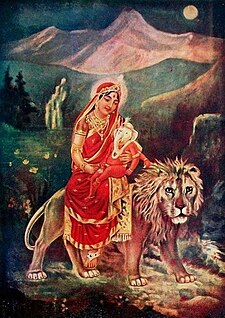
Parvati, Uma or Gauri is the supreme divinty and the Hindu goddess of power, energy, nourishment, harmony, love, beauty, devotion, and motherhood. She is a physical representation of Mahadevi in her complete form. She is also revered in her appearances as Durga and Mahakali. She is the central deity of the Goddess-oriented sect called Shaktism and the chief goddess in Shaivism. Along with Lakshmi and Saraswati, she forms the Tridevi.

Svaha, also referred to as Manyanti, is the Hindu goddess of sacrifices featured in the Vedas. She is the consort of Agni and the daughter of either Daksha or Brihaspati, depending on the literary tradition. According to the Brahmavaivarta Purana, she is an aspect of Prakriti (nature), an element without which Agni cannot sustain.
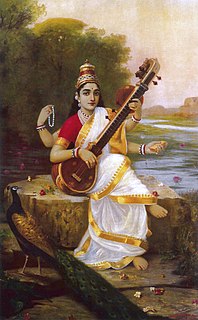
Saraswati is the Hindu goddess of knowledge, music, art, speech, wisdom, and learning. She is one of the Tridevi, along with the goddesses Lakshmi and Parvati.

Ushas is a Vedic goddess of dawn in Hinduism. She repeatedly appears in the Rigvedic hymns, states David Kinsley, where she is "consistently identified with dawn, revealing herself with the daily coming of light to the world, driving away oppressive darkness, chasing away evil demons, rousing all life, setting all things in motion, sending everyone off to do their duties". She is the life of all living creatures, the impeller of action and breath, the foe of chaos and confusion, the auspicious arouser of cosmic and moral order called the Ṛta in Hinduism.

Ratri is a Vedic goddess in Hinduism. She is the personification of the night. The majority of references to Ratri are found in Rigveda and she is described as the sister of Ushas, the personification of dawn. Together with Ushas, she is referred to as a powerful mother and strengthener of vital power. She represents cyclic rhythmic patterns of the cosmos. Her physical appearance isn't explicitly mentioned but she is described as a beautiful maiden.

Sati, also known as Dakshayani, is the Hindu goddess of marital felicity and longevity, and is worshipped as an aspect of the mother goddess Shakti. She is generally considered the first wife of Shiva, the other being Parvati, who was Sati's reincarnation after her death.

Sanjna or Samjna, also known as Saranyu and Sandhya, is a Hindu goddess and the chief wife of Surya, the Sun god. She is one of the earliest goddesses in the Hindu pantheon and is found in the Rigveda. Saranyu also appears in later texts including the Harivamsa and the Markandeya Purana. The most prominent legend of Saranyu is about her temporary abandonment of Surya and creation of Chhaya. In most texts, Saranyu is the mother of the death god Yama, the river-goddess Yami, the current Manu, the divine twin physicians Ashvins and the god Revanta.
Danu is an ancient Scythian word meaning "river". The commonly proposed etymology of the names of the Danube River, Dnieper River, Dniester River, Don River, and Donets River.
The gender of God can be viewed as a literal or as an allegorical aspect of a deity.
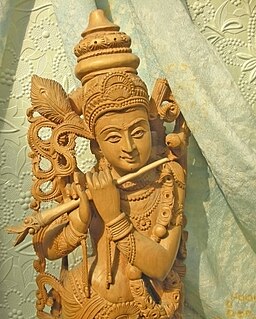
In Hinduism, there are diverse approaches to conceptualizing God and gender. Many Hindus focus upon impersonal Absolute (Brahman) which is genderless. Other Hindu traditions conceive God as bigender, alternatively as either male or female, while cherishing gender henotheism, that is without denying the existence of other Gods in either gender.

Ganga is the personification of the river Ganges who is worshipped by Hindus as the goddess of purification and forgiveness. Known by many names, Ganga is often depicted as a fair, beautiful woman, riding a divine crocodile-like creature called the Makara. Some of the earliest mentions of Ganga are found in the Rigveda, where she is mentioned as the holiest of the rivers. Her stories mainly appear in post-Vedic texts such as the Ramayana, Mahabharata, and the Puranas.
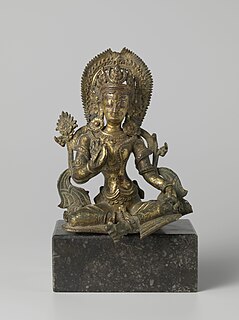
Indrani, also known as Shachi, is the queen of the devas in Hinduism. Described as tantalisingly beautiful, proud, and kind, she is also the ruler of the planet Venus. Described as the daughter of the asura Puloman, she is the consort of the King of the Gods, Indra.

In Hindu mythology, the Dānavas were a race descending from Danu, a daughter of the progenitor god Daksha. Danu is connected with the waters of the heaven and is likely associated with the formless primordial waters that existed before creation.
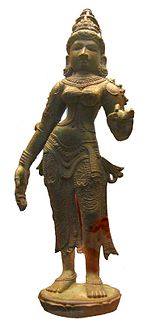
Devī is the Sanskrit word for 'goddess'; the masculine form is deva. Devi and deva mean 'heavenly, divine, anything of excellence', and are also gender-specific terms for a deity in Hinduism.
References
- ↑ Kinsley, David (1987, reprint 2005). Hindu Goddesses: Visions of the Divine Feminine in the Hindu Religious Tradition, Delhi: Motilal Banarsidass, ISBN 81-208-0394-9. p. 16.
- ↑ The European discovery of India; key indological sources of romanticism. Ganesha Publishing. "Danu, d. of Daksha, w. of Kasyapa.”
